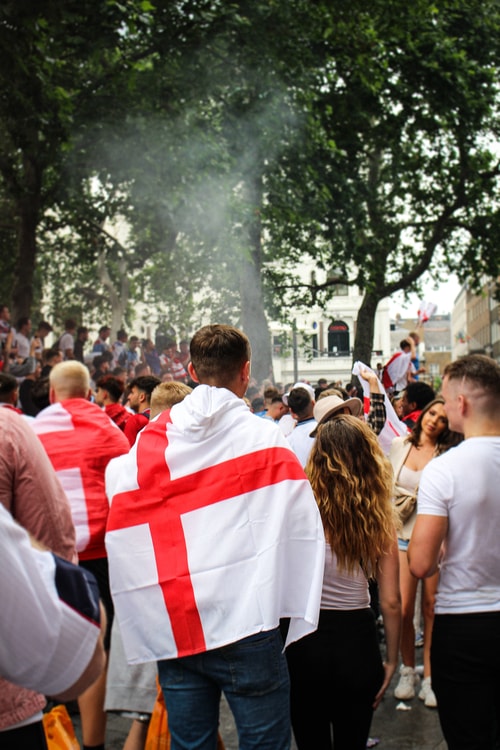Euro 2020 was reaching its finale, and as I sat on the edge of a sofa in south London, staring in disappointment at England losing to penalties, fear begun to bubble up inside.
I was worried about my safety. Travelling home that evening meant riding the tube through central London, where angry, intimidating and drunk groups of male football fans would be unavoidable. As a young woman I carry many past experiences of unwanted harassment at the hands of football hooligans, and in my mind, the England loss was only going to make this worse.
I was worried about England players too. And as I anticipated, online abuse reared its ugly head just hours after the match finished. The news media began to flood with reports of despicable and shameful racism being levelled at the team’s black players. What a painful and dismaying week for this country and those brave players.
What is othering?
A foundational topic we are focusing on at the Being Human project is the idea of ‘the other’. We want to grapple with how this term seeps into our culture, our churches and our human interactions. What does the aftermath of the Euro 2020 final teach us about the action of ‘othering’? But importantly, what does the aftermath reveal about the ugliness of my own heart in how I view and relate to others?
The ‘other’ is a philosophical term that appears in ethics, critical theory and other strands of the social sciences. It is to identify – consciously or subconsciously – an ‘other’ person or group in terms of their difference to the ‘self’. Simply put, it is how I treat or respond to people who are different to me or how I see myself. It can ultimately lead to the dehumanisation and demonisation of a person or a people group. It’s not just recognising the other but depriving that difference of its humanity.
Unfortunately, in culture we fall into this act of othering far too often. In our misrepresentations of the political refugee as a scapegoat and illegal immigrant, they are othered. In our generalisation of all investment bankers as greedy and heartless, they are othered. And yes, after the heartbreaking penalty loss, the three England players – Rashford, Sancho and Saka – were othered on social media, including abhorrent tweets using racial slurs and calls to “get back to your own country”. The impressive and talented young men went from national heroes to battering rams in a matter of seconds.
The uncomfortable challenge to followers of Jesus
In the unravelling of the Euro 2020 final, however, there has been an uncomfortable conviction that has stirred within me. Our culture tells us to tackle forms of discrimination and prejudice by deflecting the issues onto others. We can name, shame and blame everyone else but fail to notice our own acts of othering in the process.
This week I jumped into the fight of shouting judgement on the world of majority male hooliganism. I blamed toxic football culture as a vehicle for unleashing underlying racism and nationalism. Although there was truth in my judgement, and individuals inciting racism must be held to account, in my pursuit of fairness, how quick was I to once again ‘other’ and distance myself from those I sought to condemn? Did my cry for justice go too far and deprive people of their innate dignity and worth?
There is a high calling on a follower of Jesus to complete obedience. We cannot worship Him while loving only some neighbours. The male, rowdy and intimidating football fan is my neighbour, yet my prejudice placed him as the other. In the famous words of Mathew 7, Jesus describes this very issue: “How can you say to your brother, ‘Let me take the speck out of your eye,’ when all the time there is a plank in your own eye? You hypocrite, first take the plank out of your own eye, and then you will see clearly to remove the speck from your brother’s eye”. How much more gentle, discerning, and just would our work to remove other people’s specks be if we first acknowledged our own imperfections as planks? We all fall short of God’s glory and can only point others in the direction of righteousness when we recognise the mercy we need ourselves.
Ultimately, the England football team cannot truly unite us. Gareth Southgate (despite his legendary status) cannot unite us. But a community united under the mercy of Jesus can present a different story of human flourishing that goes beyond the lines of social difference. The challenge to us, as members of the body of Christ, is to recognise our own need for mercy, that we need help to lay down our prejudices towards the other and befriend those different to us. If I am honest, if a football hooligan walked into my church or home would I love him as Christ does?
It is time we all asked the difficult and uncomfortable questions of who we might be othering. Where in our churches are we falling into a limited understanding of grace? The person belonging to a different political party should be someone you gladly invite into your home. An ethnic minority leader is not your diversity token but your teacher, prophet and evangelist. The young person struggling to engage with your content is not unruly but someone with an ability to have a rich relationship with God.
Activists challenge us to do the work, to which I say: yes and amen. We should educate, engage and participate in action to eradicate forms of discrimination from our society. But this work can only be done first and foremost from our knees, bowing and crying out before our heavenly father, saying “Lord, do this work in me first.” To acknowledge and restore dignity to the other is to first repent of the ugliness taking place in our own hearts.



